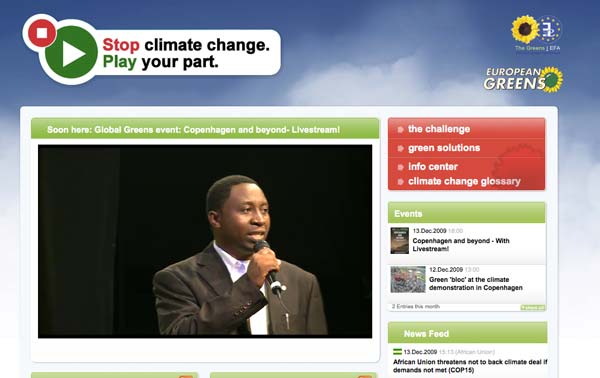From Hopenhagen to Nopenhagen – Climate change negotiations fail ï Global Greens present alternative
Share
The Global Greens are concerned that rich nations are building loopholes into the agreement to give the appearance of strong targets without the reality.
By Mike Feinstein, International Committee, Green Party of the United States
photos courtesy of Global Greens
 In Copenhagen the over-riding impression was chaos — people standing in line for hours outside in the freezing cold, while talks were deadlocked inside.
In Copenhagen the over-riding impression was chaos — people standing in line for hours outside in the freezing cold, while talks were deadlocked inside.
At a historic moment when bold action was needed desperately, the United Nations Framework Convention on Climate Change tragically failed on multiple fronts. The last-minute ëCopenhagen Accordí, negotiated mainly between the US and Chinese heads of states with involvement from India and Brazil,† had no serious commitment or plan for avoiding dangerous climate change, let alone any legally binding mechanisms.
 But perhaps even worse was the undermining of what had been a relatively open and inclusive UN process. Overriding the painstaking negotiations that had taken place during the previous two weeks,† let alone the past two to four years, the Danish government convened a meeting of 26 leaders in the last two days of the conference, leading to a complete absence of even the modest Kyoto targets previously agreed, while at the same time excluding from the process most of the world’s nations that have contributed the least to the problem, but will bear the worse of its costs.
But perhaps even worse was the undermining of what had been a relatively open and inclusive UN process. Overriding the painstaking negotiations that had taken place during the previous two weeks,† let alone the past two to four years, the Danish government convened a meeting of 26 leaders in the last two days of the conference, leading to a complete absence of even the modest Kyoto targets previously agreed, while at the same time excluding from the process most of the world’s nations that have contributed the least to the problem, but will bear the worse of its costs.
As U.S. Green Brian Tokar (Institute for Social Ecology, Vermont) observed, ìAfter the 2007 climate summit in Bali, Indonesia, the Bush administration tried to initiate an alternate track of negotiations on climate policy that involved only a select handful of the more compliant countries (the so-called Major Economies Meetings.) That strategy failed, partly because its figurehead was George Bush. Now that the Obama administration has adopted essentially the same approach, the utterly substanceless ìCopenhagen Accordî can be seen as this coercive strategyís first diplomatic successÖ. If the Copenhagen document means anything at all, it establishes that process as a new global norm for implementing climate policy. Nothing is binding, and everything is voluntary, only to be ìassessedî informally after another five years have passed.î
British journalist George Monbiot added, ìWe have now lost 17 precious years [of negotiations]; possibly the only years in which climate breakdown could have been prevented. This has not happened by accident: it is the result of a systematic campaign of sabotage by certain states, which has been driven and promoted by the energy industries. Corporate profits and political expediency have proved to be more urgent concerns than either the natural world or human civilization.
Looking ahead, climate change talks will continue through 2010, with the next Conference of Parties (COP16) scheduled for December 2010 in Mexico. Around the globe, Greens continue to seek ways to influence this process. Apart from the negotiations in Copenhagen, Greens globally were part of the massive December 12 Day of Action. Over 100,000 people gathered in Copenhagen alone while hundreds of thousands more marched in countries around the world.
The Global Greens also organized an information exchange forum for Greens in Copenhagen, and a public event on December 13 to present a Green alternative, featuring leading Green climate activists including Rebecca Harms, Marina Silva, Jose Bove, Christine Milne, Catherine GrÈze and Elizabeth May. The event was web streamed live and remains available here for viewing.
Global Greens Press Statement, December 13th, 2009
Global Greens call for honest, scientifically sound climate agreement
 As the Copenhagen COP entered its second week, the Global Greens called for an honest climate agreement, based on science, not tricky accounting.
As the Copenhagen COP entered its second week, the Global Greens called for an honest climate agreement, based on science, not tricky accounting.
The Global Greens are concerned that rich nations are building loopholes into the agreement to give the appearance of strong targets without the reality.
Land-use and forestry in particular are being used as let-out clauses to avoid actual emission reductions, according to the Global Greens Coordination, which includes representatives from Asia Pacific, African, American and European Green parties.
Tackling climate change is crucial for a sustainable future for people and the environment. The Global Greens therefore call on the worldís leaders to agree on in the next five crucial days:
1. Targets to limit global warming to 2 degrees C or less.
2. Clear 2020 targets for developed countries of at least a 40 percent reduction in emissions below 1990 levels, with an interim assessment point in 2014.
3. Commitment of substantial new funding by developed countries for mitigation and adaptation by developing countries, including reducing deforestation and degradation. This is in part recognition of the historic responsibility of developed countries for past emissions.
4. Exclusion of carbon capture and storage from the Clean Development Mechanism, and rejection of nuclear power altogether.
5. Strong pro-active measures to protect biodiversity, water and nature, whilst respecting the rights of local communities.
The COP15 should commit to finalizing a legally binding agreement in 2010 covering these and other issues, building on the Kyoto Protocol.
***************************************************************************************************************************************
Frank Habineza, Rwandan Green and African Green member of the Global Green Coordination. The† Global Greens event was webstreamed live.






